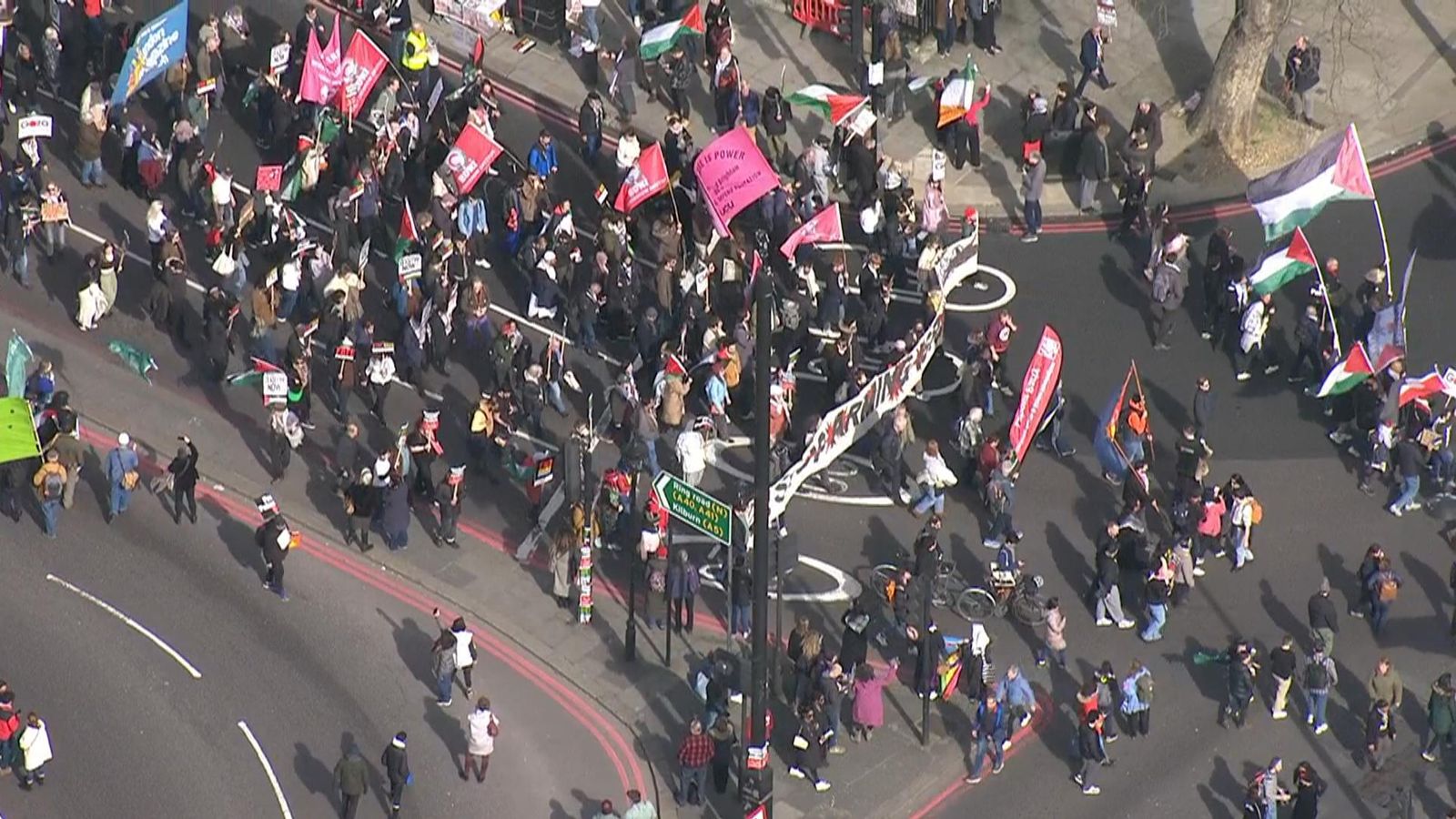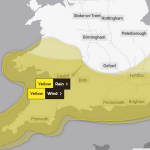Michael Gove has urged pro-Palestinian protesters to question whether extremist groups are behind some of the demonstrations – days ahead of publishing a new official definition of extremism.
The housing secretary said “good-hearted people” attending the marches should be aware they could be “lending credence” to extremists.
Tens of thousands of people participated in a Gaza protest organised by the Palestine Solidarity Campaign (PSC) on Sunday in London – the fifth march in the capital this year – which saw five arrests and a counter-demonstrator de-arrested.
While marching through central London, protesters chanted “from the river to the sea, Palestine will be free” and waved banners demanding a “ceasefire now”.
Please use Chrome browser for a more accessible video player
Mr Gove condemned the chant saying it called for the “erasure” of Israel and could fuel hate, in an interview with the Sunday Telegraph.
He said the upcoming revised definition of extremist groups would help protesters decide whether to attend future pro-Palestine events.
In the interview, he said: “If we’re clear about the nature of extremist organisations, then I think that means that some of the people – and there are good-hearted people who go on these marches, I don’t agree with them, but they’re moved by suffering and they want peace – but it may help some of them to question who are organising some of these events.”
Vital help but ‘not anything near enough’: On board a Jordan air force flight dropping aid to desperate Gazans
Charlotte Church and Jeremy Corbyn join tens of thousands at pro-Palestine march
Houthi drones shot down after ‘large-scale’ attack – as aid ship prepares to leave Cyprus for Gaza
The minister said some of the events had been “organised by extremist organisations” but would not elaborate just yet.
He continued: “That doesn’t mean that people who have gone on them are extremist, quite the opposite.
“But it means that you can begin to question: do you really want to be lending credence to this organisation? If you do, fair enough. But now there is no excuse for ignorance.”
The controversial chant of “from the river to the sea” – a reference to a Palestinian state stretching from the River Jordan to the Mediterranean – has drawn anger from some pro-Israel supporters, who argue the phrase calls for the eradication of the Israeli state.
Some pro-Palestinian supporters reject this, saying it is simply expressing the need for equality for all inhabitants of historic Palestine.
Mr Gove said: “We can also have a broader conversation about the way in which some of what’s said on these marches springs from an extremist ideology, rather than simply being an expression of passionate opposition to conflict.
“‘From the river to the sea’ is not a call for peace… when you’re saying ‘from the river to the sea’, you’re explicitly saying: ‘I want to see the end of Israel as a Jewish state, the Jewish homeland erased’.
“Be clear about the fact that you know a key Islamist demand is the erasure of what they see as the ‘Zionist entity’ or the ‘crusader Zionist state’.
“And therefore, let’s be clear that there is a difference between a cry for peace and the legitimisation of an extremist position which intimidates and leads to hate.”
Read more:
On board a Jordan air force flight dropping aid to desperate Gazans
Many marchers accuse government of inflaming strength of feeling
What is the new extremist definition?
The existing definition of extremism features in the government’s Prevent counter-radicalisation programme, which aims to stop vulnerable people from being drawn into extremism.
It’s defined as “vocal or active opposition to fundamental British values, including democracy, the rule of law, individual liberty and mutual respect and tolerance of different faiths and beliefs”.
The new definition will receive “more specificity”, and will enable the government and other public bodies to ban funding and engagement with Islamist and far-right groups.
Groups including the Muslim Council of Britain (MCB), and Palestine Action – the organisation behind the recent defacing of Lord Balfour’s portrait at the University of Cambridge – could reportedly fall under the new extremist definition.
Please use Chrome browser for a more accessible video player
In a pre-emptive statement, Zara Mohammed of the MCB said suggesting the group would be identified “under arbitrary definitions of extremism is offensive, ludicrous and dangerous”.
“Tackling extremism is a serious issue that requires serious leadership from us all. Weaponising extremism for divisive electoral gain is dangerous and we must all see through it,” she added.
Mr Gove sought to address fears from some Conservatives that the new definition could encompass gender-critical feminists or devout religious groups.
“It’s only extremism if you translate that into a political ideology that is anti-democratic,” he said.
“Private belief should be cherished. Free speech has to be protected.”
👉 Listen above then tap here to follow Electoral Dysfunction wherever you get your podcasts 👈
Mr Gove hinted that foreign governments such as Iran could be behind some of the extremist groups operating in the UK.
“One of the things that we’re explicitly looking at is the way in which foreign state and non-state actors seek to encourage extremism here,” he said.
“And again, this is inevitably sensitive work about which I can say only a very limited amount because it’s not only Iran that attempts to use some of these forces to destabilise British democracy.”
Be the first to get Breaking News
Install the Sky News app for free
Meanwhile, The Observer reports there are fears within the government that the new definition could face a legal challenge.
“The government wants to launch this without a public consultation on the definition, or proper engagement with faith leaders,” one official, who claims to have seen the proposals, told the newspaper.
“It’s never going to work.”






















